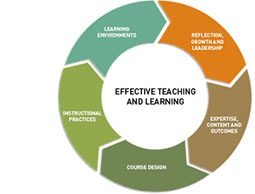Expertise, Content and Outcomes
What is meant by Expertise, Content and Outcomes?
The following video Framework for Effective Teaching - Dimension 1: Expertise, Content and Outcomes provides a brief description of this dimension of the Framework for Effective Teaching.
How can I reflect on my teaching with respect to this dimension?
Below are some questions to consider with respect to your expertise, content & outcomes:
- How appropriate is the breadth and depth of the knowledge that students are expected to learn during their course or learning situation?
- Does your course content include the most current trends, findings, and research in the field?
- Where possible, does your course content include authentic case studies, industry experience, or partnerships for learning?
- How useful and/or meaningful are the skills and attributes that your students are expected to develop or acquire?
- How challenging and innovative is your course content?
- How well informed are your teaching practices by conventions of teaching practices within your discipline, evidence-based teaching practices or methods?
- How well do you understand the difficulties students might face while trying to acquire or develop the required knowledge, skills or attitudes?
- What beliefs or principles inform your teaching practice?
- How often do you seek to become aware, reflect on, and revise the validity of your teaching assumptions?
- How deep and up to date is your knowledge of what needs to be taught including current research and interaction with other topics?
Below are some strategies that you might use to collect evidence to reflect on your teaching with respect to this dimension:
Some evidence you might collect on your own to help you reflect upon your Expertise, Content & Outcomes includes documentation of:
- Personal responses to those questions asked above.
- Reflections about the appropriateness, rigour, breadth or depth of the knowledge, skills and attributes that your students are expected to learn.
- Professional development (e.g., courses, literature, conferences, etc.) informing your expertise, content knowledge, and use of learning outcomes.
- Revisions made to course learning outcomes with explanations about your reasons for the changes.
Some evidence you might collect from your peers to help you reflect upon your Expertise, Content & Outcomes include:
- Documentations of formal and informal discussions with colleagues about your content expertise, course content, course learning outcomes, and/or effective ways of supporting students to achieve the course learning outcomes.
- Solicited or unsolicited communications from course supervisors, colleagues, chairpersons or external stakeholders.
- Nominations for awards or teaching awards received by you including departmental, faculty, and University of Alberta awards, and external awards (professional association, civic groups, nation-wide, or international teaching awards).
Some evidence you might collect from your students to help you reflect upon your Expertise, Content & Outcomes includes:
- Quantitative or qualitative measures that help observe how well do your students acquire or develop the required knowledge, attributes or skills. Some examples include:
- An analysis of how well students meet each learning outcome (as connected to each assessment).
- Asking students to indicate their confidence about their achievement of each learning outcome.
- Indicators of student progress, where available (e.g., testing prior knowledge and comparing results after learning a concept; examples of students’ work before and after learning a concept).
- Students’ perspectives about how to best acquire or develop the required knowledge, attributes or skills for your course.
- Student course evaluations (summary of numerical results, selected comments or emerging themes), mid-course or mid-term feedback solicited.
- In this dimension, focus on those questions asking about your expertise as an instructor and whether students’ felt the learning outcomes for the course were appropriate in breadth and depth.
- Recent solicited or unsolicited letters from students and teaching assistants.
How can CTL help
CTL’s mandate is to support teaching and the professional development of instructors and to support the improvement of teaching at the University of Alberta. To this end, CTL provides formative feedback on teaching observations, consultations about the types of relevant evidence of effective teaching, and information about wise reflective practices.
Any feedback from the CTL is confidential and will only be shared or discussed with the instructor.
CTL supports teaching reflection for formative but not evaluative purposes. Should you require feedback for evaluative purposes you will need to contact your department head or an administrator.
What do I do with this evidence?
Of course, you can use this evidence and reflections to make changes to your course, and we suggest that you do. We also encourage you to share these changes with your students and peers and explain why these changes were made.
Should you wish to document this evidence (and your reflections) we encourage you to consider developing a teaching dossier and other forms of engagement further explained in our What to Do After Reflecting on Your Teaching page.
